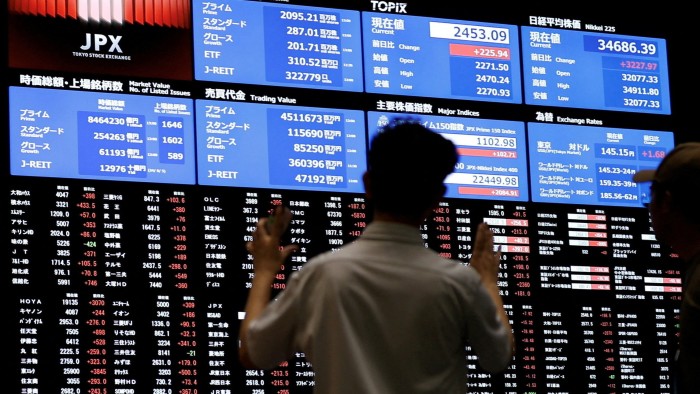Unlock the Editor’s Digest for free
Roula Khalaf, Editor of the FT, selects her favourite stories in this weekly newsletter.
Actively managed funds in Japan have underperformed comparable passive strategies over the long term, although some active fund categories, such as Japanese equities and fixed income, have shown a consistent success rate, according to Morningstar.
The inaugural Japanese edition of the research firm’s flagship active/passive barometer report analysed 1,592 Japan-domiciled open-ended and exchange traded funds across one, three, five, 10 and 15-year periods ending September 2024.
The report showed that active funds in Japan saw a lower success rate compared with a composite of similar passive strategies across many asset classes and categories, echoing Morningstar’s findings elsewhere.
The success rate in this report refers to the probability that any active fund within a category will outperform the average performance of index funds in the same category.
About one-third, or 36 per cent, of Japanese equities funds beat comparable passive strategies over a one-year period up to end-September.
But the proportion of active equities funds that outperformed passive funds fell dramatically to just 24 per cent over a three-year period, 27 per cent over five years, 14 per cent over 10 years and about 20 per cent over 15 years, the report shows.
This trend is similar for fixed income funds. Over a one-year period, nearly half (47 per cent) of active strategies performed better than their passive peers, as of September.
But over a 10-year period, the outperformance rate slipped to just 33 per cent, before falling even further to 23 per cent across a 15-year time span.
Report co-authors Daisuke Motori, director at Morningstar Japan, and Risa Mizuta, analyst at Morningstar Japan, said that it was “important not to generalise” this dwindling performance across all active funds, however.
There were certain categories within equities funds that had posted higher success rates for active funds than the rest over the long term, they noted.
At the top of this list are Japan large-cap blend equities funds, which recorded a 20 per cent success ratio over the 10-year period, versus a 14 per cent success rate for similar passive funds, based on the report.
Excluding obsolete funds, the success rate for this category improved to about 40 per cent.
Morningstar noted that in Japan, liquidation was not purely based on poor performance as funds were also liquidated after they met the pre-determined target date or net asset value.
As such, the success rate of 40 per cent was “more meaningful than what it seems”, especially since no other global equities categories achieved a success rate as high as Japan equities.
Comparatively, success rates for Japan-domiciled North America and global equities-focused funds over the five and 10-year periods were at 11.9 per cent and 10.3 per cent respectively.
Meanwhile, emerging markets equities funds had a consistently low success rate, at just around 20 per cent across all periods. Morningstar noted that this could be attributed to their huge exposure to Chinese stocks, which had underperformed in recent years.
Fixed income funds, on the other hand, generally showed a high success rate over the past three years, according to the report.
This is particularly evident in categories unaffected by foreign exchange fluctuations such as Japan bonds (68 per cent) and US bonds with hedging (56 per cent) and global bonds with hedging (60 per cent).
However, success rates for active funds tended to diminish as the duration increased. Fixed income funds under the world ex-Japan bond category saw their 10-year success rate slump to 20 per cent, from 51 per cent over a three-year period.
Findings of the Morningstar report are in line with similar studies, including a recent analysis from S&P Dow Jones Indices that revealed more than two-thirds of all Japanese equities funds underperformed the S&P Japan 500 over the six-month period that ended in June.
Additionally, the average investor in Japanese passive funds enjoyed as much as a positive 3 per cent difference in their take-home returns over total fund returns between 2019 and 2024, according to Morningstar’s Mind the Gap Japan 2024 report.
*Ignites Asia is a news service published by FT Specialist for professionals working in the asset management industry. Trials and subscriptions are available at ignitesasia.com.
Read the full article here

